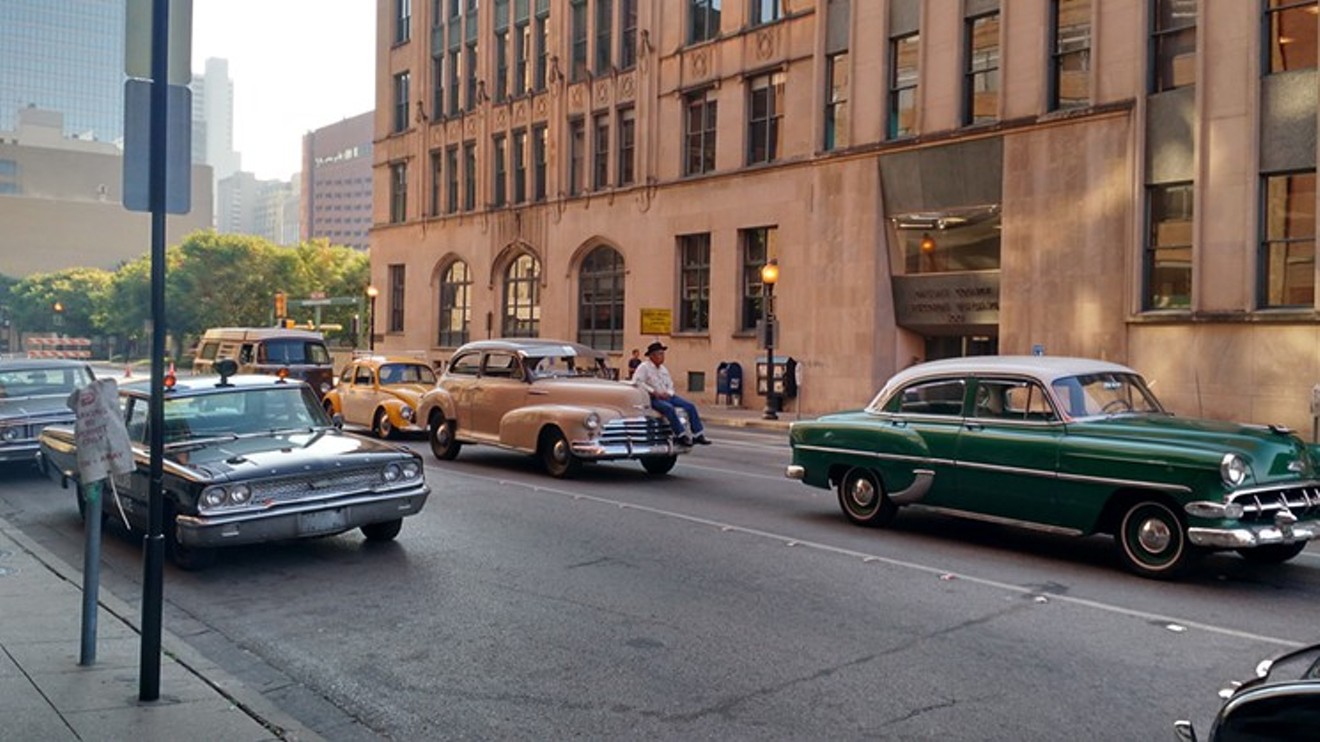Dallas has served as a backdrop for many shows and films, including the eponymous soap, Dallas; Robocop; Talk Radio; and Born on the Fourth of July. But if new legislation passes, there may not be much more filmmaking in Dallas' future.
In 2004, the Texas Legislature saw a potential economic benefit in these and other productions so they established the Texas Moving Image Industry Incentive Program. The program offers tax breaks for productions that choose to make movies, TV shows, video games, commercials and other pop culture media in Texas based on minimum in-state spending rates and local labor qualifications.
The program helped Texas become more competitive as other states like Georgia and Louisiana competed to attract more productions to shoot their shows and movies in their state.
"It changed the way the game was played," says Janis Burklund, the director of the Dallas Film Commission. "Everything became incentives first and location, equipment and crew second and third."
But not everyone who has moved into the offices of the Texas State Capitol sees the program the same way. Last year, legislators cut the program's funding by two-thirds and just recently, three bills were introduced that would dismantle the program.
State Senators Robert Hall (R-Edgewood) and Konni Burton (R-Colleyville) submitted their bills last year and Rep. Matt Shaheen (R-Plano), a former Collin County commissioner who was sworn into his second term as a state representative on Tuesday, introduced his bill just before the start of the new legislative session.
John Wildman, a local filmmaker and publicist for the Dallas Film Society, says anyone who wants to kill the incentive program isn't crunching the numbers correctly.
"There is a patented failure to do basic math," Wildman says. "You can play with numbers as people do with issues like this, but it is proven beyond a doubt that there is a beneficial return whether it be tax dollars, something like 2 to 1, or whether it's simply money that's fueled into the economy, and that's something like 5 to 1. You can shave numbers one way or the other but no matter how you look at this, there is an economic benefit to Texas and the communities and it's not just one industry but the entire state and economic base with these incentive programs."
Mindy Raymond, the executive director of the Texas Motion Picture Alliance, says that $1.7 billion has been funneled into the state since the enactment of the incentive program in 2006, and the state as a whole also earns back $4.71 for every $1 granted in tax incentives.
"It's a very healthy rebate program," Raymond says, "and if we don't have it, then they simply go elsewhere."
Raymond also notes that incentives aren't given to these productions until they can prove that they've met the necessary spending limits.
"The word incentive misleads people in this type of program," Raymond says. "It's a rebate that is given back to video production companies. So the money comes into our state first and foremost and then we give back a percentage of the in-state spending. A lot of people see that word 'incentive' and think it's a handout from the government."
Burkland says she's keeping a close eye on these bills because she's seen how hard it is to attract big budget productions with a smaller incentive that another state can easily match. She notes that several shows with story lines based in Dallas, such as the streaming network Hulu's mini-series 11/22/63 and the AMC series Halt and Catch Fire, wanted to shoot their entire productions on site but moved elsewhere because of better incentive packages in places like Georgia, which offers a maximum 30 percent tax rebate for spending on productions.
"The showrunners [for Halt and Catch Fire] were from here and wanted to shoot here but the studios don't let them come because of the incentives," Burklund says. "We'll have no shot at any of the big feature films or TV shows. They can be the gift that keeps giving if they stick around, and Atlanta's kicking our butt right now."
Raymond also notes that high-priced movie stars on the screen aren't pocketing the dough from the program. The benefits go to the crews hired to shoot the productions. She estimates that in the last five years, the incentive program has created 86,000 production jobs.
"If people want to boost the economy and create jobs, this is the one job program that does that in enormous numbers," Raymond says.
Burkland notes that the crew that works on the USA Network's dramatic thriller Queen of the South has created a lot of buzz in the industry among producers looking for production crews to hire for their projects.
"This is about them coming here and hiring local people," Burklund says. "The money's not just lining the studio's pockets. It's getting our people work and it's a clean industry. That's why other states are going after it big time."
Attempts were made to reach Rep. Shaheen for a comment but a representative of his office says he could not find time in his schedule to be interviewed by deadline.
[
{
"name": "Air - MediumRectangle - Inline Content - Mobile Display Size",
"component": "18855504",
"insertPoint": "2",
"requiredCountToDisplay": "2"
},{
"name": "Editor Picks",
"component": "17105533",
"insertPoint": "4",
"requiredCountToDisplay": "1"
},{
"name": "Inline Links",
"component": "18349797",
"insertPoint": "8th",
"startingPoint": 8,
"requiredCountToDisplay": "7",
"maxInsertions": 25
},{
"name": "Air - MediumRectangle - Combo - Inline Content",
"component": "17105532",
"insertPoint": "8th",
"startingPoint": 8,
"requiredCountToDisplay": "7",
"maxInsertions": 25
},{
"name": "Inline Links",
"component": "18349797",
"insertPoint": "8th",
"startingPoint": 12,
"requiredCountToDisplay": "11",
"maxInsertions": 25
},{
"name": "Air - Leaderboard Tower - Combo - Inline Content",
"component": "17105535",
"insertPoint": "8th",
"startingPoint": 12,
"requiredCountToDisplay": "11",
"maxInsertions": 25
}
]












